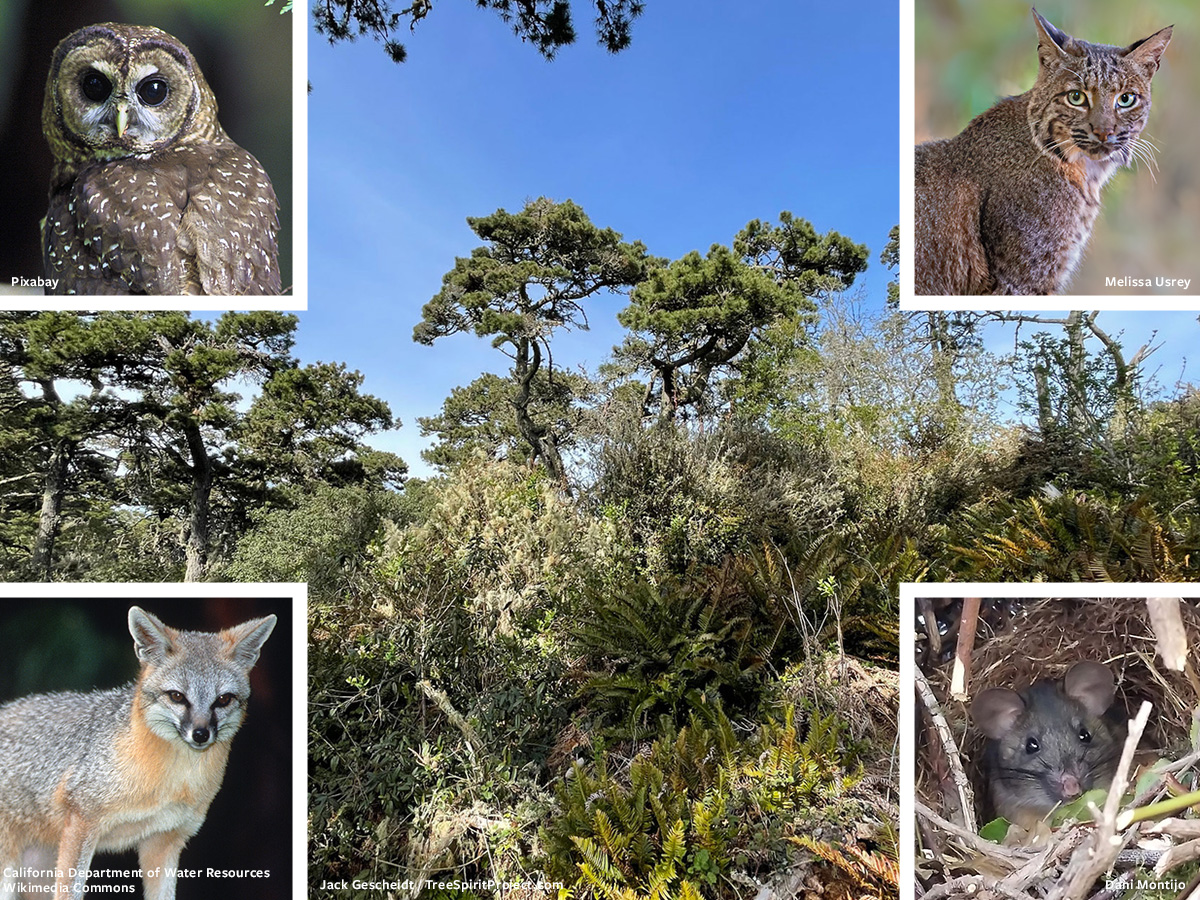Good News! Activists Delay California Parks Deforestation Project
Thanks to the thousands of In Defense of Animals supporters who spoke out, countless wild animals and their forest home have been granted a reprieve from destruction at Tomales Bay State Park in Marin County, California, but the fight to stop California State Parks’ so-called management project isn’t over yet.
For weeks, California State Parks (Cal Parks) was scheduled to pitch its monstrous forest “management” project to the California Coastal Commission on March 15. The project is in reality a massive deforestation project that would denude acres of dense, healthy, wild forest at Tomales Bay State Park with chainsaws, chippers, and herbicides. But just three days before its Friday presentation to the Commission — Cal Parks’ project must comply with the California Coastal Act — the agency yanked it from the calendar without explanation.
But we know why Cal Parks staff backed off. They got scared by the outpouring of all of us activists and citizens! We submitted scores of scientific challenges and critical public comments and made calls to the Commission — more than 9,700 people signed our alert. We activists, along with concerned citizens and animal rights and environmental groups are all challenging Cal Parks’ pseudo-scientific justifications for destroying a forest — supposedly in order to save it. Sound familiar? Chainsaws and masticators and chemical poisons by the likes of Monsanto and Dow Chemical, they tell the public, will “restore” Bishop pine trees, while simultaneously, miraculously reducing wildfire danger.
But we know the truth. Cal Parks, like other state and federal agencies, wants millions of dollars in wildfire reduction funding, which it can be awarded by, in effect, yelling “Wildfire!” in a crowded, healthy, living forest.
The flood of public comments details how Cal Parks’ so-called “health initiative” and “thinning” project would damage the lush, damp forest along Tomales Bay, which is on the Point Reyes peninsula. This is adjacent to Point Reyes National Seashore where more wild, public land — and more precious animal habitat — is also under assault (by private cattle ranchers’ operations that pollute land, streams, and the Pacific Ocean).
Cal Parks’ so-called forest “management” would also increase wildfire danger because “thinning” forests — which is just a euphemism for cutting down hundreds of trees both living and dead — and shredding thousands of moisture-capturing understory plants — dries out a forest. Felling hundreds of trees lets more sunlight into a lush, dense, healthy forest. So it dries out and becomes more flammable. This industrial “thinning” also allows more winds that accelerate wildfires.
The most effective and efficient way to protect against wildfire danger is not to “treat” forests but to treat nearby houses, usually within about 30 feet of the house, and not more than 100 feet away. But there is no money in this science-based approach; no state agency funds are available for the only effective fire protection, so it is ignored.
The deforestation would also wreak havoc on countless thousands of wild animals who live in the forest. Hundreds of dens, burrows, thickets, and bird nest homes would be obliterated along with the trees (both living and dead) and bushes where wild animals hide and thrive, out of human sight and human reach.
The wild forest at Tomales Bay State Park would be “manicured” like a city park, destroying countless wild animal homes and hiding places. “Man” “I” “cure” wild, naturally “messy” dense forests — which are healthy natural forests.
Countless mammals and birds, including foxes, skunks, raccoons, squirrels, woodrats, ravens, woodpeckers, opossums, great horned owls, bobcats, black-tailed deer, and many more creatures would be terrorized and scared away by 10 years of loud, gasoline-powered heavy machinery.
The decibels, destruction, and fumes from chainsaws, chippers, and masticating machines — plus thousands of hours of worker boots on the ground — drive wildlife away. Additionally, thousands of delicate, living, microbes in the forest’s rich soil would be poisoned with toxic herbicides which drift and drain into the adjacent Tomales Bay, micro-contaminating the water, harming fish, sea otters, and other marine life.
We now have an additional month’s time to prepare for the Coastal Commission meeting — rescheduled for April 11 — thanks in part to your letters and phone calls of support, to protect this wooded reserve, and advocate for wild animals and wild forests everywhere. These destructive killing projects are masquerading as “health initiatives” and “wildfire reduction” projects.
If you’d like to help, you can register before 5 pm, Wednesday, April 10 to make a public comment to the Commissioners when Cal Parks presents its deforestation (PWP, item #10a) project for approval on Thursday, April 11, via Zoom or telephone. From this webpage, scroll down and click the bottom left tab, “Thursday, April 11, 9:00 am” (changing its color from blue to green). Fill out the form and you’ll receive an email confirmation from the Commission to speak on Thursday (along with In Defense of Animals activists).
We haven’t won this fight and Cal Parks won’t quit; the agency will continue to seek millions of dollars. Tragically, agencies legislated to protect and steward public lands and forests are now often their destroyers. People seeking huge amounts of money can act in a corrupt manner when money is at stake.
But we won’t quit either. What happens at Tomales Bay matters, because it’s happening across millions more acres of California, and the western United States. Many similar “wildfire reduction” projects in California are targeting healthy, previously unmanaged forests and destroying for dollars what little wild animal habitat remains.
We will continue to educate the public and inform the media that “managing” wild forests just destroys forests. And that wild forests are where the wild things roam - in all of us.
Stay tuned for updates on how to protect Tomales Bay State Park from this deadly destruction. In the meantime, you can find more ways to help by visiting our Wild Animals and Tule Elk campaigns.


